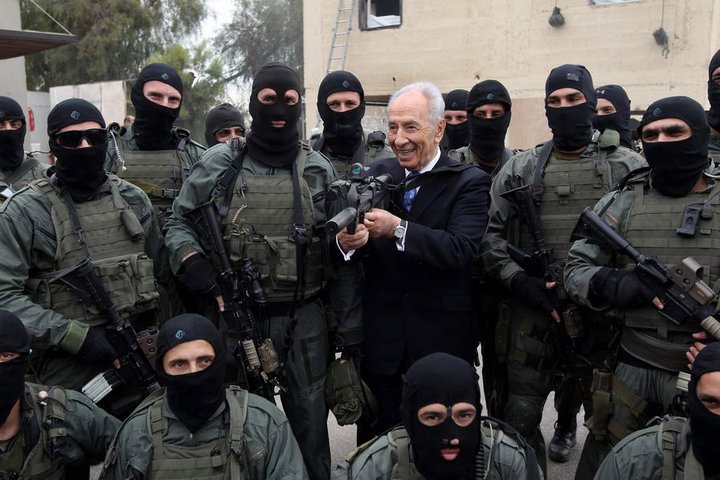Learn about the history of the Palestinian struggle for freedom, equality and justice by exploring major events in the history of their oppression on this day of the year.
20 September
 BLOODY RECORD OF ISRAELI 'PEACEMAKER'
BLOODY RECORD OF ISRAELI 'PEACEMAKER'
On this day in 2016, Shimon Peres died. Three times Prime Minister, Peres was a military hawk with an entirely undeserved reputation as a dove. He supported every Israeli aggression against its neighbours. He developed Israel’s secret nuclear arsenal, and forged an alliance with apartheid South Africa. To bolster his chances of becoming Prime Minister in 1996, he invaded Lebanon. When Israel bombed a UN compound in Qana, killing over 100 civilians, Peres said he was “at peace with it”.
السجل الدموي لـ "صانع السلام" الإسرائيلي
سبتمبر20
في مثل هذا اليوم من عام 2016، توفي شمعون بيريس. كان بيريز رئيسا للوزراء ثلاث مرات، وكان صقرا عسكريا وهو الملقب بالحمامة وهذه سمعة لا يستحقها لأنه دعم كل عدوان إسرائيلي على جيرانها. طور بيريس ترسانة إسرائيل النووية السرية، وشكل تحالفًا مع نظام الفصل العنصري في جنوب إفريقيا. لتعزيز فرصته في أن يصبح رئيسا للوزراء في عام 1996، غزا لبنان. عندما قصفت إسرائيل مجمعاً للأمم المتحدة في قانا، وأسفر عن مقتل أكثر من 100 مدني، (قال بيريز انه مرتاح لذلك).
In 1979, a U.S. satellite detected signs of a nuclear explosion
An analysis of the evidence today points to a clandestine nuclear test, a Carter administration cover-up, and only one country that was willing and able to carry it out: Israel. Shortly before sunrise on Sept. 22, 1979, a U.S. surveillance satellite known as Vela 6911 recorded an unusual double flash as it orbited the earth above the South Atlantic. At Patrick Air Force Base in Florida, where it was still nighttime on Sept. 21, the staff in charge of monitoring the satellite’s transmissions saw the unmistakable pattern produced by a nuclear explosion—something U.S. satellites had detected on dozens of previous occasions in the wake of nuclear tests. The Air Force base issued an alert overnight, and President Jimmy Carter quickly called a meeting in the White House Situation Room the next day.
The bloody legacy of Nobel Peace Laureate Shimon Peres
Shimon Peres was no peacemaker. I’ll never forget the sight of pouring blood and burning bodies at Qana
Peres said the massacre came as a ‘bitter surprise’. It was a lie: the UN had repeatedly told Israel the camp was packed with refugees. When the world heard that Shimon Peres had died, it shouted “Peacemaker!” But when I heard that Peres was dead, I thought of blood and fire and slaughter. Shimon Peres, standing for election as Israel’s prime minister – a post he inherited when his predecessor Yitzhak Rabin was assassinated – decided to increase his military credentials before polling day by assaulting Lebanon. The joint Nobel Peace Prize holder used as an excuse the firing of Katyusha rockets over the Lebanese border by the Hezbollah. In fact, their rockets were retaliation for the killing of a small Lebanese boy by a booby-trap bomb they suspected had been left by an Israeli patrol. It mattered not.
After Israel's 1996 massacre at Qana "there was a UN enquiry which stated in its bland way that it did not believe the slaughter was an accident. The UN report was accused of being anti-Semitic."
